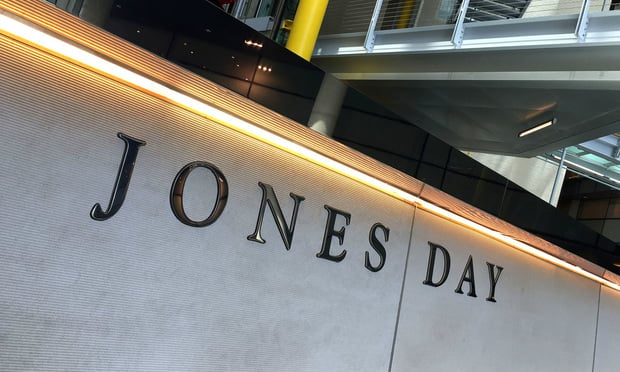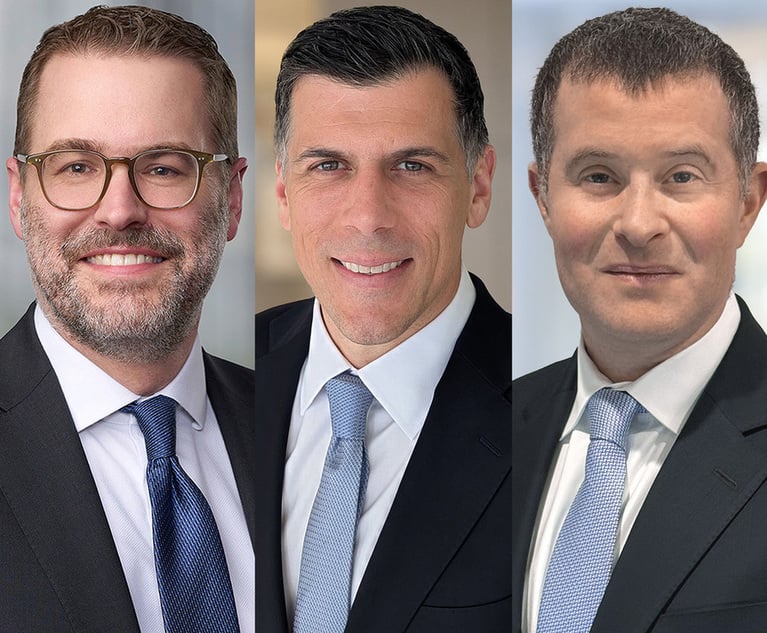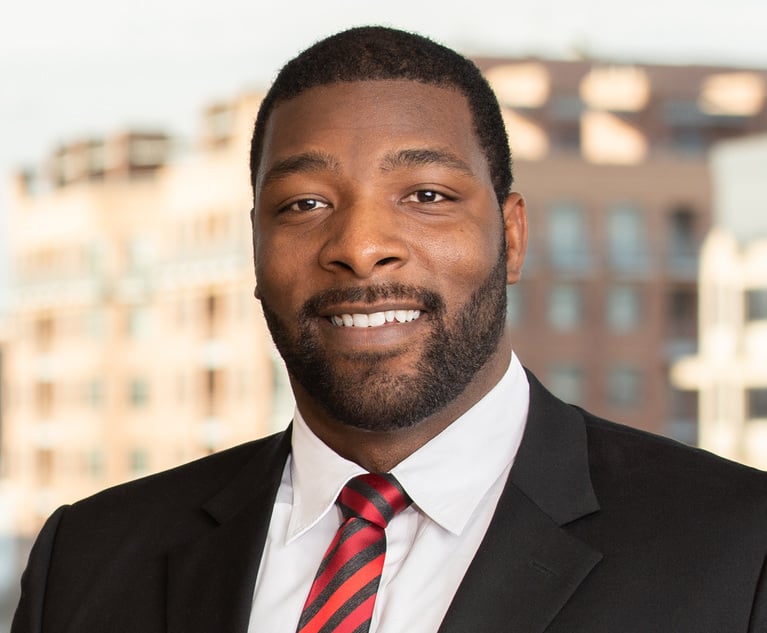Jones Day, Accusers Square Off Over Hidden Identities in Gender Bias Case
“There's really nothing exceptional about this case” that warrants anonymity for the plaintiffs, Jones Day argued at a hearing in Washington.
May 30, 2019 at 03:39 PM
4 minute read
 Jones Day offices in Washington, D.C. Photo: Diego M. Radzinschi/ALM
Jones Day offices in Washington, D.C. Photo: Diego M. Radzinschi/ALM
A federal judge in Washington, D.C., ruled Thursday that four former Jones Day associates can continue to keep their identities hidden from the public—for now—in a $200 million gender bias case against the firm.
But the judge also issued a limited order allowing Jones Day to disclose the women's names to the extent needed to investigate their claims and respond to their complaint.
Amid the arguments over anonymity, U.S. District Judge Randolph Moss also implored lawyers for both sides to tread carefully when speaking to press about the two-month-old proposed class action, and he urged them to tone down the bitter rhetoric exchanged in the case so far.
Lawyers at Sanford Heisler Sharp brought the case in early April on behalf of six former Jones Day women associates, including four identified only as Jane Doe, alleging that the firm's opaque compensation model, management structure and culture have led to systematic bias against women lawyers there.
Jones Day sought to compel the U.S. District Court for the District of Columbia to make the names of all six of the accusers public. At a hearing on the motion Thursday, Jones Day labor and employment partner Terri Chase argued that revealing the names was necessary for the firm to conduct a full investigation into the plaintiffs' claims and to offset “client concerns” stemming from negative publicity.
“There's really nothing exceptional about this case,” Chase said, citing “hundreds” of other employment controversies where the plaintiffs' names are revealed.
Chase said Jones Day had been approached by people with information relevant to the case who knew the two named plaintiffs, California-based former associates Nilab Rahyar Tolton and Andrea Mazingo. Keeping the other accusers' names hidden has obstructed the firm's efforts to respond to the complaint, she argued.
She also asserted that Sanford Heisler Sharp's decision to publicize the allegations in the press had created a negative public perception and a suggestion that Jones Day would retaliate against the plaintiffs—despite placing nothing into the court's record that suggested “any intent, likelihood, or action” of retaliation on the firm's part.
The judge asked Deborah Marcuse, Sanford Heisler Sharp's Baltimore managing partner, whether any of the accusers knew that Jones Day had sought to undermine their ability to get different jobs. Marcuse responded that it was the “belief of some” plaintiffs that Jones Day had done so.
Marcuse pointed to unrelated cases handled by Sanford Heisler Sharp to describe the kinds of retaliation that Jones Day might pursue if the Jane Doe plaintiffs were named. Moss reprimanded her for relying on speculation and noted that the burden rested with the plaintiffs to support such a “serious” charge.
As the back-and-forth in the courtroom grew more heated, Moss told attorneys for both sides he would not find charged language from either side to be persuasive.
“I would encourage both sides to avoid overheated rhetoric in pleadings,” Moss said.
The judge also warned that litigating in the court of public opinion instead of his courtroom does “affect the balance” of the case. Moss said attorneys were well within their rights to talk to the media, but added, “if you do want to speak to the press, there are consequences that come from that.” He did not identify what those consequences could be.
Moss ordered the four unnamed plaintiffs to provide declarations supporting their requests to continue under pseudonyms next month, and also asked for a joint status report by June 19 that would indicate whether Sanford Heisler Sharp intends to amend its complaint to include additional claims or accusers.
In the meantime, he held that Jones Day “may disclose the identities of the Jane Doe Plaintiffs for the sole purpose of investigating the allegations contained in the Complaint and for preparing an answer or dispositive motion in response.”
Read More
Jones Day Bungled Bid to Quash Anonymity, Gender Bias, Plaintiffs Allege
Associates Assail 'Fraternity Culture' at Jones Day in $200M Sex Bias Suit
Ex-Partner Accuses Jones Day of 'Fraternity' Environment, Gender Bias
This content has been archived. It is available through our partners, LexisNexis® and Bloomberg Law.
To view this content, please continue to their sites.
Not a Lexis Subscriber?
Subscribe Now
Not a Bloomberg Law Subscriber?
Subscribe Now
NOT FOR REPRINT
© 2025 ALM Global, LLC, All Rights Reserved. Request academic re-use from www.copyright.com. All other uses, submit a request to [email protected]. For more information visit Asset & Logo Licensing.
You Might Like
View All
Wilmer, White & Case, Crowell Among the Latest to Add DC Lateral Partners
4 minute read
Lawyers Across Political Spectrum Launch Public Interest Team to Litigate Against Antisemitism
4 minute read

Government Contracting Clients Look to Firms to Stay on Top of Trump Policy Changes
4 minute readTrending Stories
- 1States Accuse Trump of Thwarting Court's Funding Restoration Order
- 2Microsoft Becomes Latest Tech Company to Face Claims of Stealing Marketing Commissions From Influencers
- 3Coral Gables Attorney Busted for Stalking Lawyer
- 4Trump's DOJ Delays Releasing Jan. 6 FBI Agents List Under Consent Order
- 5Securities Report Says That 2024 Settlements Passed a Total of $5.2B
Who Got The Work
J. Brugh Lower of Gibbons has entered an appearance for industrial equipment supplier Devco Corporation in a pending trademark infringement lawsuit. The suit, accusing the defendant of selling knock-off Graco products, was filed Dec. 18 in New Jersey District Court by Rivkin Radler on behalf of Graco Inc. and Graco Minnesota. The case, assigned to U.S. District Judge Zahid N. Quraishi, is 3:24-cv-11294, Graco Inc. et al v. Devco Corporation.
Who Got The Work
Rebecca Maller-Stein and Kent A. Yalowitz of Arnold & Porter Kaye Scholer have entered their appearances for Hanaco Venture Capital and its executives, Lior Prosor and David Frankel, in a pending securities lawsuit. The action, filed on Dec. 24 in New York Southern District Court by Zell, Aron & Co. on behalf of Goldeneye Advisors, accuses the defendants of negligently and fraudulently managing the plaintiff's $1 million investment. The case, assigned to U.S. District Judge Vernon S. Broderick, is 1:24-cv-09918, Goldeneye Advisors, LLC v. Hanaco Venture Capital, Ltd. et al.
Who Got The Work
Attorneys from A&O Shearman has stepped in as defense counsel for Toronto-Dominion Bank and other defendants in a pending securities class action. The suit, filed Dec. 11 in New York Southern District Court by Bleichmar Fonti & Auld, accuses the defendants of concealing the bank's 'pervasive' deficiencies in regards to its compliance with the Bank Secrecy Act and the quality of its anti-money laundering controls. The case, assigned to U.S. District Judge Arun Subramanian, is 1:24-cv-09445, Gonzalez v. The Toronto-Dominion Bank et al.
Who Got The Work
Crown Castle International, a Pennsylvania company providing shared communications infrastructure, has turned to Luke D. Wolf of Gordon Rees Scully Mansukhani to fend off a pending breach-of-contract lawsuit. The court action, filed Nov. 25 in Michigan Eastern District Court by Hooper Hathaway PC on behalf of The Town Residences LLC, accuses Crown Castle of failing to transfer approximately $30,000 in utility payments from T-Mobile in breach of a roof-top lease and assignment agreement. The case, assigned to U.S. District Judge Susan K. Declercq, is 2:24-cv-13131, The Town Residences LLC v. T-Mobile US, Inc. et al.
Who Got The Work
Wilfred P. Coronato and Daniel M. Schwartz of McCarter & English have stepped in as defense counsel to Electrolux Home Products Inc. in a pending product liability lawsuit. The court action, filed Nov. 26 in New York Eastern District Court by Poulos Lopiccolo PC and Nagel Rice LLP on behalf of David Stern, alleges that the defendant's refrigerators’ drawers and shelving repeatedly break and fall apart within months after purchase. The case, assigned to U.S. District Judge Joan M. Azrack, is 2:24-cv-08204, Stern v. Electrolux Home Products, Inc.
Featured Firms
Law Offices of Gary Martin Hays & Associates, P.C.
(470) 294-1674
Law Offices of Mark E. Salomone
(857) 444-6468
Smith & Hassler
(713) 739-1250








